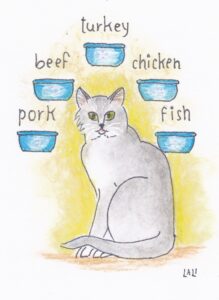You may have heard about the third-world immigrant who, newly arrived in the U.S., suffered an anxiety attack in the bread aisle of the supermarket. Accustomed to having a single choice back home, she freaked out at the multitude of options available in America: white, whole wheat, multi-grain, honey-oats, raisin, organic, buns, baguettes, tortillas, gluten-free, locally made…How to even begin to choose the best-tasting, most economical, healthiest, ideal bread for her family?
From bread to television, from clothing to life partners, we are surrounded by a quantity of choices unimaginable even a generation ago. And choice is often a good thing—as in a woman’s right to choose whether to bear a child, and everyone’s right to choose a President. But in other ways the choices that confront us on a daily basis can, as in the case of the recent immigrant, lead to stress.
Take for instance the choice of spouse, on its face a very good thing for persons of all genders and sexual orientations. For most of human history, people’s choice was limited not only by the strict and often quirky norms imposed by society and religion, but by geography. Unless you were a royal princess promised from birth to the heir of a foreign throne, you were likely stuck with the guys in your village. In many societies even that was not a choice, because your parents did the choosing. But if the marriage failed, at least it was their fault, not yours.
I am not for arranged marriages, but given the divorce statistics—almost 50% in the U.S.—how much worse could we do? Perhaps the ability to choose, among thousands of potential mates, the ONE who will make us happy for the rest of our life places too heavy a load of expectation on the fragile vehicle of marriage. I worry that the trend to extravagant weddings with troops of bridesmaids, string quartets, and horse-drawn carriages betrays the nervousness of the couple regarding their chances of enduring.
Those of us who came of age in the sixties, before online dating became available, mostly married people from our village equivalent—the college or the office. But especially for women, in that decade the number of choices escalated. Not only could we opt for skirts that barely covered our derrière or plunged down to our ankles, but we could choose, for the first time in history, when and whether to have children. The early pill was primitive enough that many women, including me, couldn’t tolerate it, and many babies still came about through a combination of planning and pure chance.
Now birth control is safe and effective, single motherhood is not disgraceful, and women can postpone having children indefinitely. The only option a woman doesn’t have is that of not choosing. If she “does nothing,” she is still deciding, since the biological clock ticks on inexorably. If later on she regrets her choice, she has only herself to blame. Gay couples who desire children are blessedly able to have them, but they face an array of decisions as to the biological means by which to do so. While it’s good that all these choices are available, they come at a cost.
As for the children born in our choice-obsessed culture, an unprecedented set of decisions awaits them. Not only do they have to discern, at an ever earlier age, what is their sexual orientation, but their gender identity as well—and what, if anything, they want to do about it. That’s quite a burden for those slender shoulders.
With total freedom and its promise of bliss comes total responsibility, and inevitable anxiety. The right choice, the culture tells us, will make us happy, but the wrong choice will make us miserable, and we’ll have only ourselves to blame. We humans haven’t yet evolved to deal skillfully with the options afforded by science and technology. We’re like toddlers driving race cars: the ride is exhilarating, but the potential for mishaps is frightening.
We can’t eliminate the choices at our disposal without doing grave injustice to many, so we have to live with them somehow. And hope that our primate hearts will someday catch up to the opportunities that our brains have created.



6 Responses
Then there’s E. O. Wilson’s throwaway line, “The trouble with humanity is that we have Paleolithic emotions, Medieval institutions, and godlike technology!” Alas, life doesn’t get easier.
A perfect quote. Thank you!
Thank you, Lali and John! (Yes, both of you—I refuse to choose.)
It’s good to know when to say “enough”!
I just looked it up: India’s divorce rate is less than ONE PERCENT.
A lot of that is due to arranged marriages.
When I visited in 1969 as a Girl Guide representing Mexico, our cohort of Guides from all over the world talked about everything, including marriage. The Indian girls – of different religions – ALL expected their parents to choose their husband, and thought the rest of us were crazy to expect to make such an important decisions for ourselves.
That is an amazing statistic! Even accounting for girls and women who are too downtrodden to leave an abusive relationship, there is probably something to be said for marriages entered into with parental guidance (not compulsion) and with the involvement and support of the community.